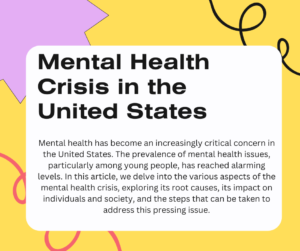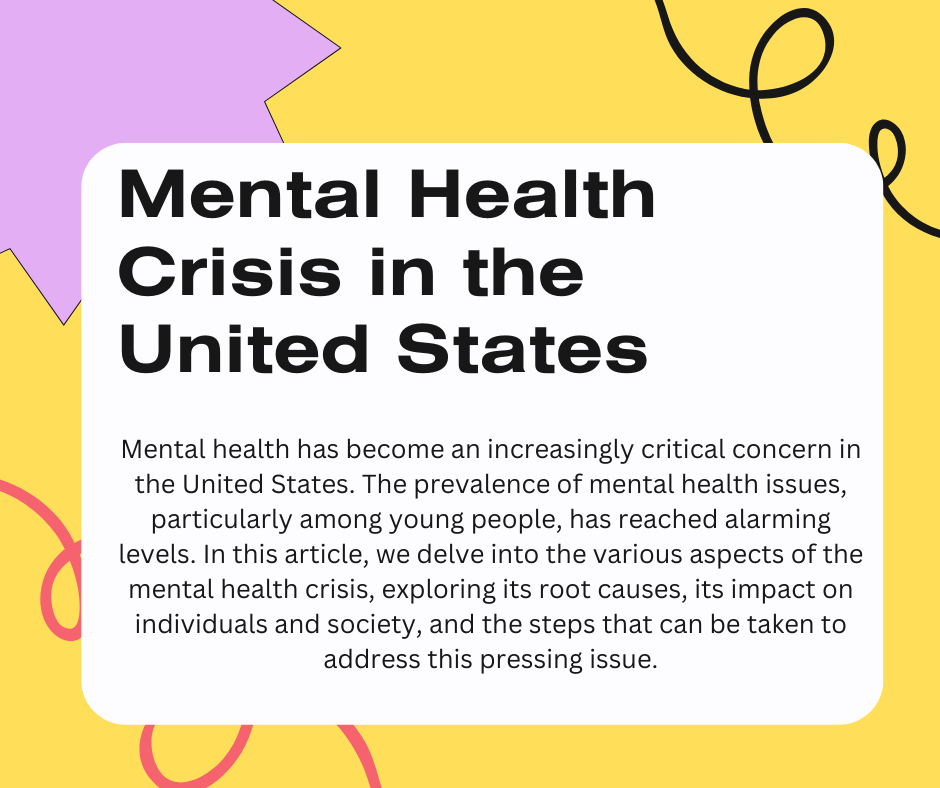Mental Health Crisis in the United States: Understanding, Impact, and Solutions
Introduction
Mental health has become an increasingly critical concern in the United States. The prevalence of mental health issues, particularly among young people, has reached alarming levels. In this article, we delve into the various aspects of the mental health crisis, exploring its root causes, its impact on individuals and society, and the steps that can be taken to address this pressing issue.

Understanding the Mental Health Crisis
Definition and Scope of Mental Health Crisis
“mental health crisis” refers to heightened mental health problems that significantly impact a population’s well-being. It encompasses many disorders, including anxiety, depression, bipolar disorder, and more severe conditions.
Prevalence in the United States
Research reveals that mental health issues are widespread in the United States, affecting millions of people across different age groups. According to recent data, the prevalence of mental health disorders has increased, particularly among young individuals.
Factors Contributing to the Crisis
Social Media and Technology
The advent of social media and advanced technology has undoubtedly transformed society, but it also brings specific adverse effects on mental health. The constant exposure to virtual environments and cyberbullying contribute significantly to escalating mental health problems.
Economic and Financial Stress
Economic instability and financial hardships place immense stress on individuals, increasing anxiety and depression. Economic inequalities and uncertain job prospects further exacerbate the mental health crisis.
Academic Pressure and Performance Anxiety
The pressure to excel academically and high expectations from parents and society often leads to performance anxiety among students. This academic stress has a detrimental impact on their mental well-being.
Impact on Young People
Rising Rates of Depression and Anxiety
Young people in the United States face a considerable rise in depression and anxiety disorders. Academic and social pressures, coupled with the challenges of adolescence, contribute to this distressing trend.
Suicidal Ideation and Self-Harm
Tragically, an increasing number of young individuals report suicidal ideation and engage in self-harm as a coping mechanism. The mental health crisis has a profound impact on their emotional stability.
Substance Abuse and Addiction
Substance abuse and addiction are often linked to mental health issues. Many young people use drugs and alcohol to cope with their emotional struggles.
Mental Health Policies and Support
Current State of Mental Health Policies
The United States’ mental health policies have improved over the years, but there is still much room for progress. Proper implementation and access to mental health services remain a challenge.
Accessibility to Mental Health Services
One significant barrier to addressing the crisis is the lack of accessibility to mental health services in many regions—rural communities, in particular, face difficulties in accessing adequate support.
Importance of Early Intervention
Early intervention in mental health issues is crucial for effectively managing and preventing more severe conditions. Identifying symptoms early on can significantly improve outcomes.
Stigma Surrounding Mental Health
Breaking Down the Stigma
The stigma surrounding mental health prevents many individuals from seeking help and support. Breaking down these barriers is essential to promote mental well-being.
Creating Supportive Environments
Supportive environments encouraging open discussions about mental health can be vital in destigmatizing mental health issues.
Role of Education and Awareness
Implementing Mental Health Education
Incorporating mental health education into school curricula can help raise awareness and equip students with coping mechanisms.
Promoting Awareness Campaigns
Public awareness campaigns are instrumental in educating society about mental health and dispelling misconceptions.
Community Involvement and Support
Local Initiatives and Non-profit Organizations
Communities can be pivotal in supporting individuals facing mental health challenges through local initiatives and non-profit organizations.
Peer Support and Group Therapy
Engaging in peer support groups and group therapy can provide a sense of belonging and help cope with mental health difficulties.
Innovations in Mental Health Care
Telemedicine and Digital Health Platforms
Advancements in telemedicine and digital health platforms have opened new avenues for remote mental health support.
Therapeutic Advancements and Research
Ongoing research and therapeutic advancements continue to improve the efficacy of mental health treatments.
Addressing Mental Health in the Workplace
Employee Well-being Programs
Promoting employee well-being and implementing mental health programs can foster a healthier work environment.
Work-Life Balance and Flexibility
Striking a balance between work and personal life is essential for maintaining good mental health.
Impact of the Pandemic on Mental Health
Coping with Uncertainty and Isolation
The COVID-19 pandemic has exacerbated the mental health crisis, with many individuals struggling to cope with uncertainty and isolation.
Long-term Effects on Mental Well-being
The pandemic’s long-term effects on mental well-being have become a concerning issue that requires attention and support.
Seeking Help and Resources
Hotlines and Crisis Intervention
Providing accessible helplines and crisis intervention services can be life-saving for distressed individuals.
Online Support Communities
Online communities and forums offer a safe space for individuals to share experiences and seek support.
The Role of Government and Policy Makers
Legislative Efforts and Funding
Increased legislative efforts and funding are vital to strengthen mental health infrastructure and support.
Integrating Mental Health in Public Policy
Integrating mental health considerations into broader public policy can provide more comprehensive solutions.
Combating Mental Health Crisis: The Way Forward
Building a Supportive Society
Creating a supportive society that prioritizes mental health can help in reducing the crisis’s prevalence.
Investing in Mental Health Infrastructure
Investing in mental health infrastructure is necessary to meet the growing service demand.
Conclusion
Addressing the mental health crisis in the United States requires a multi-faceted approach involving policy changes, increased awareness, and community support. By breaking down stigma, fostering support systems, and investing in mental health infrastructure, we can work towards building a healthier and more resilient society.
FAQs
- Q: What is the mental health crisis in the United States? A: The mental health crisis refers to heightened mental health problems that significantly impact the population’s well-being.
- Q: How prevalent are mental health issues in the United States? A: Mental health disorders affect millions of people across different age groups, with a concerning rise among young individuals.
- Q: What factors contribute to the mental health crisis? A: Several factors, including social media, economic stress, and academic pressure, contribute to escalating mental health issues.
- Q: How does the mental health crisis affect young people? A: Rising rates of depression, anxiety, suicidal ideation, and substance abuse are some of the impacts on young individuals.
- Q: What can be done to combat the mental health crisis? A: Addressing the crisis requires increased awareness, accessible support services, and integration of mental health into public policy.



